How does parliament shape security policy? The participants of the Core Seminar took a glance at the daily business of parliament in discussions with members of the German Bundestag.
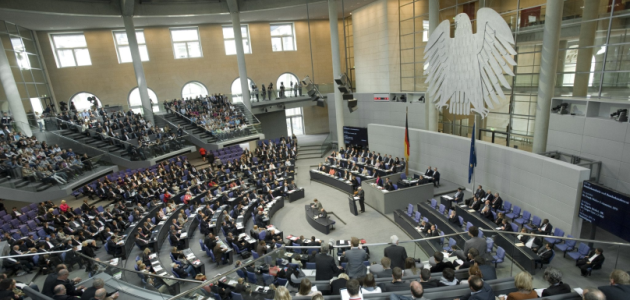
As anywhere else these days, security issues are a top item on the agenda of the Bundestag.
Picture: Deutscher Bundestag/Marc-Steffen Unger
At the end of the first seminar module, the 2017 Core Course discussed parliamentary procedures and political positions on current security issues. For this purpose, Thomas Wrießnig, Vice President of the Federal Academy for Security Policy, welcomed three members of the German Bundestag: Hans-Christian Ströbele (Bündnis 90/Die Grünen), Dr Fritz Felgentreu (SPD), and Stefan Liebich (Die Linke).
Dealing with Russia: Deterrence and Dialogue
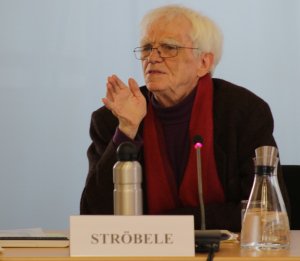
Engaging in dialogue and building trust is the only way to “prevent the establishment of a new Iron Curtain,” said Hans-Christian Ströbele, MP.
Picture: BAKS
At first, the discussion focused on the new security situation in Eastern Europe. In this context, the Federal Government continues to rely on comprehensive dialogue with Russia, while simultaneously pursuing military deterrence to protect the East European NATO partners. The recent buildup of NATO forces in the Baltic States and in Poland aimed at reassuring these partners sparked a particularly controversial debate in the seminar.
Felgentreu, for example, highlighted that the annexation of the Crimean Peninsula in spring 2014 and the war in Eastern Ukraine has since shown that decisive action must be taken against Russia's power-political ambitions. According to the SPD foreign policy expert, this is a question of solidarity with the eastern members of NATO and the EU whose “real security has to be reinforced.” Mr Ströbele of Bündnis 90/Die Grünen countered that the deployment of additional forces was counterproductive, and that priority had to be given to talks: “We need to re-engage in dialogue to lay the foundation for trust. This is the only way to prevent the establishment of a new Iron Curtain.”
Mali and the Enable & Enhance Initiative
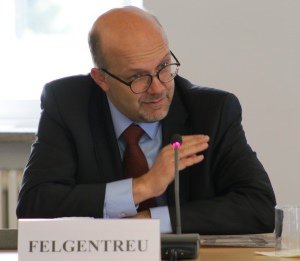
Dr Fritz Felgentreu, MP called for greater German solidarity with the East European member states of NATO and the EU. Picture: BAKS
With a seminar trip to Mali scheduled for summer, Germany's civil-military commitment in this country received much attention in the Course's discussion. This commitment primarily consists of providing training and equipment in order to build up the Malian security forces; as part of the Enable & Enhance Initiative, the Federal Government sets aside 130 million euros each year to be used exclusively for this type of measures in crisis regions. The three members of the Bundestag also disagreed widely on this issue.
Whereas Felgentreu underscored the importance of the German commitment in Mali for providing security in Europe, Liebich cautioned about potential risks that strengthening regional security forces might entail. He said that while German troops could “train the armed forces in Mali, they cannot decide what they will do with this knowledge at the end of the day.”
Germany's Role in Refugee Policy
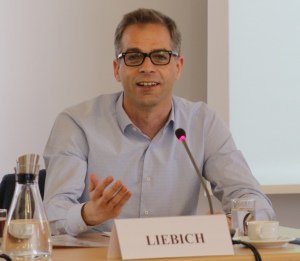
Stefan Liebich, MP pointed out the potential risks posed by strengthening the military of regional partners. Picture: BAKS
Another important topic of discussion were refugee movements and migration. “There is no European solution in refugee policy,” Ströbele said about the perspectives of common action at the European level – to the surprise of many of the participants of the seminar. However, Germany could also seize this as an opportunity to form a “Coalition of the Willing” comprising those countries that are ready to lead by example and admit refugees in the face of the low level of solidarity displayed by some EU member states, Ströbele added.
At the same time, the panellists made clear that more emphasis needed to be placed on combatting the causes of migration. All three members of the Bundestag agreed that comprehensive civil measures and greater economic assistance were required to address this issue. A first step, Ströbele suggested, could be improving trade relations between Africa and Europe. The politician of Bündnis 90/Die Grünen explained that currently, agricultural producers from Africa hardly stand a chance to establish themselves on the heavily subsidised European markets.
Fake News, Hate Postings and the 2017 Federal Elections
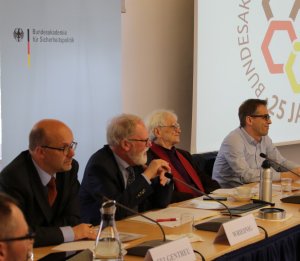
The members of parliament together with Thomas Wrießnig (second from left), Vice President of the Federal Academy. Picture: BAKS
The final segment gave an outlook on the Federal elections held in September 2017, centering on the opportunities and threats of the Internet. Everyone seemed to agree that the Internet has become one of the central platforms of political debate – which is why many members of the Bundestag have hired social media professionals to take care of their homepages. On the other hand, “hate comments” in social media aimed at creating a certain climate of opinion pose a problem. Such postings usually attack minorities, contain homophobic, anti-Semitic or otherwise offensive messages, and often include calls for violence.
But the parliamentarians warned that it was not easy to take specific action against these postings. Liebich, the politician of Die Linke, stressed that it was necessary to rely on the common sense of the general public, and to raise awareness of the dangers lurking on the Internet. SPD member Felgentreu mentioned that fake news were not a new phenomenon, but as old as humanity itself: “We simply must be able to deal with this and inform the citizens.” He was more worried by attacks on the infrastructure surrounding the electoral process. Hackers, for example, could attack polling institutes in order to manipulate sensitive data and distort the results of opinion polls. This is when the time has definitely come for the security authorities to step in.
Authors: Martin Roscher and Robbin Schacht
